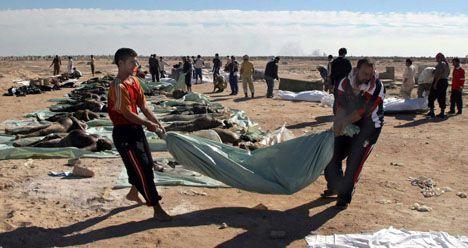Iraqi government helps as morgues fill up

Iraqi volunteers carry wrapped bodies for their funeral in the Shiite holy city of Najaf, 160 kilometers (100 miles) south of Baghdad, Iraq, Friday, Nov. 10, 2006. The bodies of 176 victims of recent sectarian violence were brought from Baghdad to Najaf AP Photo/Alaa al-Marjani
Nov 13, 2006
Last updated on May 12, 2016 at 06:18 a.m.
With no space to store bodies, some victims of the sectarian slaughter are not being kept for relatives to claim, but photographed, numbered and quickly interred in government cemeteries. Men fearful of an anonymous burial are tattooing their thighs with names and phone numbers.
In October, a particularly bloody month for Iraqi civilians, about 1,600 bodies were turned in at the Baghdad central morgue, said its director, Dr. Abdul-Razaq al-Obaidi. The city’s network of morgues, built to hold 130 bodies at most, now holds more than 500, he says.
Bodies are sent for burial every three or four days just to make room for the daily intake, sometimes making corpse identification impossible.
“We can’t remove all the bodies just so that one can be identified and then put them all back in again,” al-Obaidi said. “We simply don’t have the staff.”
Get The Daily Illini in your inbox!
Al-Obaidi said the daily crush of relatives is an emotional and logistical burden.
“Every day, there are crowds of women outside weeping, yelling and flailing in grief. They’re all looking for their dead sons and I don’t know how the computer or we will bear up,” he said.
While no one knows how many Iraqis have died, daily tallies of violent deaths by The Associated Press average nearly 45 a day. About half of them are unidentified bodies discovered on city streets or floating in the Tigris River.
The United Nations estimates about 100 violent deaths daily and the Iraqi health minister last week put civilian deaths over the entire 44 months since the U.S. invasion at about 150,000 _ close to the U.N. figure and about three times the previously accepted estimates of 45,000-50,000.
In morgues across Iraq where capacity stretches beyond thin, bodies are even being turned away.
“We have to reject them,” Hadi al-Itabi of the morgue in Kut, southeast of Baghdad, said he told men who turned in the bodies of six slain border policeman last week. “We just don’t have enough cold storage.”
Iraq’s bureaucracy of death is overwhelmed.
The task of identifying and interring bodies is all the more difficult because of the clandestine nature of the killings: Increasingly, Iraqis are being killed far from home and in secret, the victims of kidnappers and sectarian death squads.
With nowhere else to look when a friend or loved-one goes missing, family members first check the local morgue.
Abbas Beyat’s joined the line outside Baghdad’s central morgue after his brother Hussein disappeared a month ago while driving through the mainly Sunni town of Tarmiyah, 30 miles north of Baghdad.
The family had already paid a $60,000 ransom to an intermediary who then disappeared with the money.
“There were three piles, each with about 20 bodies,” Beyat, 56, said, describing the scene inside the morgue.
“The clerk told me to dig through them until I found my brother. I had to lift them off until I found him,” he said.
Like many of those abducted, Hussein Beyet bore the marks of torture, with holes from an electrical drill visible in his skull, Beyat said.
Others never find their loved ones’ bodies at all.
The fear of leaving the bereaved without a corpse to bury is so strong that some Iraqi men now tattoo their names, phone numbers and other identifying information on their upper thighs, despite Islam’s strict disapproval against such practices.
On the day he turned away the border policemen’s bodies, Al-Itabi said Kut’s morgue had already buried 15 unidentified corpses pulled from the Tigris River, all of them bound, bullet-riddled, and heavily decomposed.
The government cemetery in Kut, opened on Sept. 24, already holds the graves of 135 unidentified victims.





